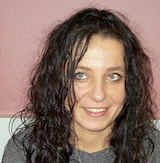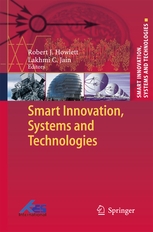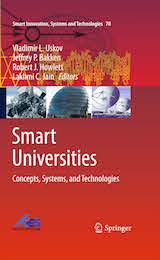Keynote Speakers
We are very pleased to have acquired the services of an excellent selection of keynote speakers for the symposium The speakers and the titles of their talks are shown below.
Anthony Brooks
Aalborg University, DenmarkWhen computers can dream...Artist perspective on Smart Digital Future(s)
More details ...
Ernesto Damiani
Khalifa University of Science and Technology, Abu Dhabi, UAEPay with a Group Selfie: towards zero-financial-cost purchase proofs
More details ...
Anna Esposito
Università degli Studi della Campania "Luigi Vanvitelli", ItalyInfluence of the social, cultural, and physical context in decoding emotional expressions
More details ...
Mirjana Ivanovic
University of Novi Sad, SerbiaPersonalized HealthCare and Agent Technologies
More details ...
Anthony (aka Tony) L. Brooks
Aalborg University, DenmarkWhen computers can dream...Artist perspective on Smart Digital Future(s)
Abstract:
This SDF plenary keynote briefly introduces the speaker's research and development that was considered pioneering at a time when adaptive non-invasive sensor systems mapped to digital multimedia as real-time biofeedback to stimulate human responses through gameplay and creative expression were used rarely in the fields addressed. 'Afferent-Efferent neural feedback loop closure' via tailored design of Virtual Interactive Space through the applied system was catalyst. The talk relates how many scoffed at the early-bespoke work without witnessing this human-centered 'Virtual Reality' application in e.g. rehabilitation, education, and other experiential and 'training' contexts. Yet, sponsorship by IBM followed the speaker's presentation to the company's Scandinavian Vice Director alongside the head of Corporate Social Responsibility, who subsequently arranged a personal viewing by Vice President, IBM International Foundation at Corporate Headquarters, Armonk, New York, given by the speaker. As a result, global showcase events over many years included IBM linked cultural, scientific, and business events held as a part of e.g. the Olympics/Paralympics, European City of Culture, and more via IBM global. These showcases around the world highlighted the trans-disciplinary concept and societal impact through such applied use of digital technologies targeting human well-being. Video examples of showcases will supplement the talk.
The second part of the talk will introduce parallel analogies to contemporary innovations that question what Smart Digital Future(s) are ahead - the good, the bad, and the ugly!

Biography:
Dr. Anthony Brooks is Associate Professor at Aalborg University, Denmark where he is director/founder of the 'SensoramaLab'' (Virtual Reality, HCI and Playful Learning Complex) and a founding team-member of the Medialogy education wherein he is now a section leader, lecturer, coordinator, supervisor, and study board member. Originating from Wales, born into a family with disabled members, at an early age he invented 'alternative solutions' for adaptive accessibility and 'control''. In the 1980s he created bespoke instruments and volumetric invisible sensing systems for unencumbered gesture-control of digital media to stimulate meaningful causal interactions that could be tailored to individuals, their needs, preferences and desires alongside the outcome goals of facilitators, therapists, educators etc. A goal was to create adaptable playful, enjoyable, and fun creative experiences for end-users that optimised motivation in participation to increase compliance and adherance to transdisciplinary intervention programmes e.g. in rehabilitation, healthcare wellbeing, quality of life, learning/education, play, entertainment, recreation, and more: Societal impact was targeted. He was the first artist in residence at the Centre for Advanced Visualisation and Interactivity (CAVI) at Aarhus University, Denmark at the end of 1990s originated the ZOOM model (Zone of Optimized Motivation) for in-action intervention and on-action analysis and assessment /refinement. He has approximately 200 publications. His research is responsible for - sizable externally funded national and international (European) projects, a serious-games industry start-up company, and a family of patents resulting from the evolved method and prototypes, e.g. US6893407 "Communication Method and Apparatus". He is acknowledged as a third culture thinker and "world pioneer in digital media and its use with the disabled community". He is an active keynote speaker at international events and has presented globally. He is an ambassador for accessibility and is Danish representative for UNESCO's International Federation for Information Processing (IFIP) Technical committee (WG14) on "Entertainment Computing" - specifically under work groups WG14.7 "Art and Entertainment"; WG14.8 "Serious Games", and WG 14.9 "Game Accessibility". He works with the European Commission as EU expert examiner.
Picture credit: Ron Powell
Ernesto Damiani
Khalifa University of Science and Technology, Abu Dhabi, UAEPay with a Group Selfie: towards zero-financial-cost purchase proofs
Abstract:
The boundaries between financial services and ICT are fading as potential users who are in geographic areas with patchy network coverage will be able to use innovative services for supporting open-air market transactions. The talk introduces a project jointly run by Institut de Mathematiques et de Sciences Physiques (IMSP) at Dangbo, Benin, Universita' degli Studi di Milano and the Etisalat British Telecom Innovation Center in Abu Dhab. the iinitiative is a Bill and Melinda Gates Foundation Grant. The PGS approach uses personal pictures, or 'selfies' as a form of transaction proof towards safe exchange of money in places that do not possess other viable technologies, such as debit or credit machines, and where cash may be difficult to obtain or dangerous to carry. This project uses visual encryption to split photos taken by mobiles into secure shares, that can later be reassembled as a proof-of-sale transaction. Its application is to delay micro-payments in system allows sharing the cost of a traditional payment transaction among multiple sales, potentially decreasing it to a minimum. Also, the tralk will discuss how the PGS system can be used as a front end for virtual and crypto-currencies.

Biography:
Ernesto Damiani is the Director of the Information Security Research Center at Khalifa University of Science and Technology, Abu Dhabi, and the leader of the Big Data Initiative at the Etisalat British Telecom Innovation Center (EBTIC) . Ernesto is on leave from the Department of Computer Science, Universita degli Studi di Milano, Italy, where he leads the SESAR research lab and coordinates several large scale research projects funded by the European Commission, the Italian Ministry of Research and by private companies such as British Telecom, Cisco Systems, SAP, Telecom Italia and many others. Ernesto's research interests include Cloud Security and Assurance, Big Data and privacy-preserving Big Data analytics. He is the Principal Investigator of the TOREADOR H2020 project on models and tools for Big data-as-a-service. Ernesto is an ACM Distinguished Scientist and the recipient of the Stephen Yau Award. He received a doctorate honoris causa from INSA-Lyon for his contributions to education and research in the Big Data area.
Anna Esposito
Università degli Studi della Campania "Luigi Vanvitelli", ItalyInfluence of the social, cultural, and physical context in decoding emotional expressions
Abstract:
Emotional feelings permeate our everyday experience, consciously or unconsciously, driving our daily activities and constraining our perception, actions and reactions. During daily interactions, our ability to decode emotional expressions plays a vital role in creating social linkages, producing cultural exchanges, influencing relationships and communicating meanings. Emotional information is transmitted through verbal (the semantic content of a message) and nonverbal (facial, vocal, gestural expressions, and more) communicative tools and relations and exchanges are highly affected by the way this information is coded/decoded by/from the addresser/addressee.
The accuracy above the chance in decoding facial emotional expressions suggested they can play the role of psychological universals. However this idea is debated by data suggesting that they play the role of social messages dependent upon context and personal motives.
These open questions are discussed in this talks, at the light of experimental data obtained from several experiments aimed to assess the role of context on the decoding of emotional facial expressions. The reported data support more the idea that facial expressions of emotions are learned to efficiently and effectively express intentions and negotiate relations, even though particular emotional aspects show similarities across cultural boundaries.
Research devoted to the understanding of the perceptual and cognitive processes involved in the decoding of emotional states during interactional exchanges is particularly relevant in the field of Human-Human, Human-Computer Interaction and Robotics, for build and harden human relationships, and developing friendly, emotionally and socially believable assistive technologies

Biography:
Anna Esposito received her "Laurea Degree" summa cum laude in Information Technology and Computer Science from the Università di Salerno in 1989 with a thesis on: The Behavior and Learning of a Deterministic Neural Net (published on Complex System, vol 6(6), 507-517, 1992). She received her PhD Degree in Applied Mathematics and Computer Science from the Università di Napoli, "Federico II" in 1995. Her PhD thesis was on: Vowel Height and Consonantal Voicing Effects: Data from Italian (published on Phonetica, vol 59(4),197-231, 2002) and was developed at Massachusetts Institute of Technology (MIT), Research Laboratory of Electronics (RLE), under the supervision of professor Kenneth N Stevens.
She has been a Post Doc at the International Institute for Advanced Scientific Studies (IIASS), Assistant Professor at the Department of Physics at the Università di Salerno (1996 -2000) and Research Professor (2000-2002) at the Department of Computer Science and Engineering at Wright State University (WSU), Dayton, OH, USA. She is WSU Research Affiliate.
Anna is currently Associate Professor in Computer Science at the Department of Psychology, Università della Campania "Luigi Vanvitelli". Her teaching responsibilities include Cognitive and Algorithmic Issues of Multimodal Communication, Human Machine Interaction, Cognitive Economy, and Decision Making. She authored 170+ peer reviewed publications in international journals, books and conference proceedings. She edited/co-edited 25 books and conference proceedings with Italian, EU and overseas colleagues.
Anna has been the Italian Management Committee Member of:
- COST 277: Nonlinear Speech Processing,
http://www.cost.esf.org/domains_actions/ict/Actions/277 (2001 -2005) - COST MUMIA: MUltilingual and Multifaceted Interactive information Access,
www.cost.esf.org/domains_actions/ict/Actions/IC1002 (2010 -2014) - COST TIMELY: Time in Mental Activity, www.timely-cost.eu (2010-2014)
- Chair of COST 2102:Cross Modal Analysis of Verbal and Nonverbal Communication,
http://www.cost.esf.org/domains_actions/ict/Actions/2102 (2006 -2010) - Member of the European Network for the Advancement of Artificial Cognitive Systems,
Interaction and Robotics (www.eucognition.org, 2006- to date) - Currently, she is the Italian Management Committee Member of COST Actions CA15218 ((http://www.cost.eu/COST_Actions/ca/CA15218?management): Measuring homelessness in Europe and the Management Committee Substitute of the COST Action IS1406 (http://www.cost.eu/COST_Actions/isch/IS1406?management): Enhancing children's oral language skills across Europe and beyond.
Anna's research interest cover the following lines of investigation:
- 1998 to date: Cross-modal analysis of speech, gesture, facial and vocal expressions of emotions. Timing perception in language tasks.
- 1995 to date: Emotional and social believable Human-Computer Interaction (HCI).
- 1989 to date: Neural Networks: learning algorithm, models and applications.
CONTACT DETAILS:
Anna Esposito, PhD, Associate Professor
Department of Psychology, Laboratory of Behavioural Cognitive Systems (BeCogSys),
Università degli Studi della Campania "Luigi Vanvitelli", viale Ellittico 34, 81100, Caserta, and IIASS
phone: + 39 338 1829988; +39 089 761167;+39 0823 274797
emails: anna.esposito@unina2.it; iiass.annaesp@tin.it;
webpages: http://www.iiassvietri.it/en/ricerca-in-campo-socio-sanitario.html
http://win.iiassvietri.it/anna.html
http://www.psicologia.unina2.it/en/ricerca/gruppi-di-ricerca/behavioural-cognitive-systems-ergonomia-cognitiva
Mirjana Ivanovic
University of Novi Sad, SerbiaPersonalized HealthCare and Agent Technologies
Abstract:
Remarkable gains in life expectancy and declines in fertility have led current society to an ageing global population. Different stakeholders, researcher communities and policy makers invest serious efforts to develop intelligent and smart environments that have to support as much as possible independent living of old population. As necessary prerequisite for these efforts rapid and fascinating development in ICT offers wide range of new technologies including wearable, 3D sensors and smart environments. These new technologies provide rich complex data from living environment and give the opportunity to learn and analyze them in order to discover the patient's preferences, traits, and states. Further research efforts are oriented to personalized healthcare and development of sophisticated e-coaching facilities to obtain proper recommendations and advices to patients in order to increase their wellbeing.
Among different artificial intelligence methods and techniques agent technologies significantly influence and support different medical domains. The use of agents and multi agent systems in healthcare has also opened the ways to find out new applications like personalized and socialized healthcare platforms and systems with tailored recommendation capabilities. In this paper opportunities and challenges that agent technologies offer in personalized healthcare are discussed and presented.

Biography:
Mirjana Ivanovic holds the position of Full Professor at Faculty of Sciences, University of Novi Sad, Serbia. She is a member of the University Council for Informatics. She is author or co-author of 14 textbooks, several monographs and more than 330 research papers, most of which are published in international journals and conferences. Her research interests include agent technologies, intelligent techniques (CBR, data and web mining), effects on various data mining and machine learning algorithms and applications, programming languages and software quality, e-learning and web-based learning, and software engineering education. She is/was a member of Program Committees of more than 200 international conferences, Program/General Chair of several international conferences, and leader of numerous international research projects. Mirjana Ivanovic delivered several keynote speeches at international conferences, and visited numerous academic institutions all over the world as visiting researcher. Currently she is Editor-in-Chief of the Computer Science and Information Systems journal. (e-mail: mira@dmi.uns.ac.rs).






